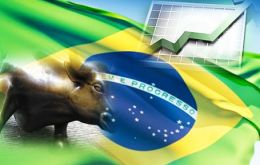MercoPress. South Atlantic News Agency
Tag: Brazil economy
-
Wednesday, August 12th 2015 - 07:30 UTC
Moody's tough on Brazil but also confident on a mid term growth rebound

Moody’s Investors Service cut Brazil’s credit rating to near-junk status on Tuesday but said the country’s coveted investment grade status is safe for now, proving some relief to investors and the government of President Dilma Rousseff.
-
Wednesday, July 29th 2015 - 06:00 UTC
S&P warns Brazil could lose investment-grade rating as economic slippage continues

Standard & Poor's on Tuesday said Brazil could lose its coveted investment-grade rating in the coming year if fallout from a number of corruption investigations further stymies economic growth and the implementation of austerity measures.
-
Tuesday, July 28th 2015 - 06:13 UTC
Brazil central bank survey confirms worst economic performance since 1990

Analysts expect Brazil's economy to contract by 1.76% this year, marking its worst performance since 1990, with the inflation rate hitting 9.23%, the Central Bank said on Monday.
-
Monday, July 27th 2015 - 06:45 UTC
Banks forecasting two years of economic contraction for Brazil

Banks in Brazil are now forecasting economic contraction in 2016 and if this proves correct it will be first time Latin America's largest economy shrinks two years running since the Great Depression.
-
Thursday, July 23rd 2015 - 08:52 UTC
Brazil's recession expected to continue next year according to top bank

Brazil's recession will extend into next year, hurting President Dilma Rousseff's efforts to shore up public finances and arrest a sharp increase in unemployment, Itau Unibanco's chief economist said in a report on Wednesday. Ilan Goldfajn forecasts a drop of 2.2% in 2015 and 0.2% in 2016, down from previous estimates for a decline of 1.7% in 2015 and an increase of 0.3% in 2016.
-
Tuesday, July 14th 2015 - 06:00 UTC
Brazil's economic team reaching out to credit rating agencies for a vote of confidence

Concerns that Brazil may lose its coveted investment grade credit rating are again on the rise among government officials and investors who worry that President Dilma Rousseff’s austerity push won’t fully offset plunging government revenues.
-
Saturday, June 20th 2015 - 09:06 UTC
Brazil' economic activity further contracts in April as confidence dwindles

Economic activity in Brazil fell sharply in April from March, worse than already negative market estimates and showing still more evidence the once-booming economy is heading toward a recession.
-
Tuesday, June 16th 2015 - 06:03 UTC
Brazil's auto industry faces plummeting sales and widespread layoffs

Plummeting auto sales in Brazil amid the country's worst economic situation in a decade have battered the industry that makes up one-fourth of the country's industrial gross domestic product and has led to widespread layoffs and mandatory leaves.
-
Friday, June 12th 2015 - 06:02 UTC
World Bank forecasts Argentina will regain access to capital markets in 2017

The World Bank is optimistic about the outlook for the Argentine economy, predicting the country’s GDP will grow 1.1% this year, a considerable upgrade from the decline of 0.3% it expected in January, and perhaps even stronger growth of 1.8% in 2016 and of 3% points in 2017, thanks to a “stronger” macroeconomic environment and “regained” access to international capital markets.
-
Wednesday, June 10th 2015 - 06:04 UTC
Brazil launches ambitious $64bn infrastructure package to prop the economy

Brazil announced a $64 billion infrastructure spending package on Tuesday, hoping to revive its flagging economy with investment in highways, railroads, ports and airports. Businesses and analysts have long pointed to overburdened infrastructure as a drag on the world's seventh-largest economy, which pays high prices to ship the raw materials it exports.
